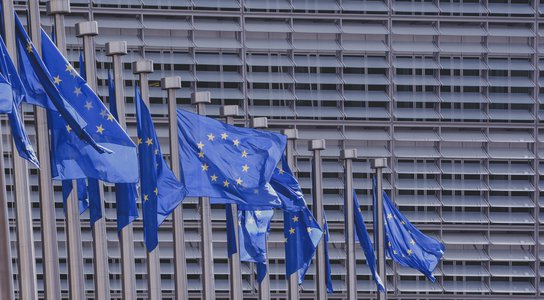A major EU vote and a direct call to action from investors with assets worth €1.7 trillion signals the start of a transformation of the financial sector – which could help in delivering on the Paris climate agreement, and prevent human rights abuses.
This week has seen historic moves from across both politics and industry, which could transform the financial sector in the European Union.
The European Parliament has made a major step towards a more ethical financial sector, by unanimously voting for new rules that mean investors will have to put proper measures in place ensuring their activities do not cause human rights abuses or environmental destruction.
This major move was also backed by big players in the investment industry itself – with the likes of Aviva, Hermes, Sycomore and Robeco issuing a major call on investors to set up and carry out robust due diligence processes to manage risks to people and the environment. They also urgently called on governments to support investor due diligence through better regulation of financial systems.
The signatories to the letter represent a €1.7 trillion voice in support for legislation to mainstream this kind of risk management in global financial systems. These investors outline how “we are at a point in time where both people and planet face severe challenges, including: catastrophic food and water shortages and displaced populations due to climate change, some 40 million people living in situations of modern slavery, half the world lacking access to essential health services, and technology being weaponized against democracy.
“Therefore, it is vital that investors are able to identify whether the projects or companies they are investing in might have negative impacts on human rights and sustainable development, and then contribute to preventing and mitigating those impacts.”
Global Witness, who have been long campaigning for a more ethical and sustainable financial sector in the EU, today celebrated the new momentum from both political actors and the financial industry to transform the sector.
The anti-corruption NGO has previously highlighted how Europeans’ money – and EU-based investors – far too often play a key role in funding projects linked to human rights abuses, land grabs and large-scale environmental destruction. They have highlighted examples from oil exploration in Africa’s oldest national park to a mining project in India, which sparked violent protests.
Rachel Owens, Head of EU Advocacy, Global Witness said:
“Investors across Europe play a powerful role in improving both the overseas and European operations of companies they invest in. And by using their significant leverage, they can insist on higher environmental, social and governance standards in the projects they choose to invest in. This week’s vote, paired with loud call to action from major institutional investors – many of whom manage our pensions and savings – shows that we could finally be seeing the kind of transformation we need in Europe’s financial sector: one that puts people and planet before profit.”
“We now need to see real leadership from the European Commission and Supervisory Authorities to follow this strong political will from investors and the EU alike by ensuring these ESG due diligence rules are properly implemented.”
Paul Tang MEP, Special Rapporteur for Sustainable Finance said:
“It is very positive and encouraging to see investors embracing due diligence. Due diligence is the framework which enables investors to mitigate and avoid sustainability risks and impacts associated with their investment decisions. If due diligence is applied, companies will be not only be more transparent and more sustainable, they will also achieve higher risk adjusted returns. This underlines the societal value and ultimately justifies the existence of a company.”
“This is another example of how sustainable finance is not an abstract idea of left wing politicians: it is already central to large parts of the financial sector today. Ambitious legislation that promotes best practices and prompts the laggards to improve, starting with the Disclosure Regulation, is very much complementary to this development.”
Sabrina Ritossa Fernandez of Sycomore Asset Management, one of the signatories to the statement, said:
“Given today’s social and environmental challenges, integrating ESG factors, including risks to human rights, in portfolio management must be a priority for all investors on a global scale.”
Carola van Lamoen of investor Robeco said, “Institutional investors increasingly recognize that they have a vital role to play in ensuring that businesses are environmentally and socially sustainable. We welcome the European Union’s leadership in clearly communicating due diligence expectations of investors, helping to ensure finance works for people and planet.”
Barbara Bijelic, Financial Sector Lead, Responsible Business Conduct Unit, OECD:
“This Regulation represents a milestone in ensuring that the financial sector plays a key role in attaining global sustainability goals. We welcome the efforts of the EU to align expectations under the Regulation with existing, broadly supported standards such as OECD due diligence guidance.
“Such alignment is crucial to ensuring that financial institutions report not only on environmental and social impacts identified within their portfolios, but also their efforts to address them. It also contributes to establishing predictability for practitioners and harmonizing expectations across jurisdictions and initiatives.”
/ ENDS
Contacts
-
Rachel Owens
Head of EU Office and EU Advocacy / Directrice du Bureau (UE). Campaign Lead on Corporate Accountability
You might also like
-
Blog post Four things to keep in mind ahead of the European elections in May
We want to send a clear message to those parties, candidates and countries preparing for the European Elections: tackling corruption and damage done to people and planet must be front of mind.
-
Blog post 8 facts about sustainable finance – and how it affects you
This is what you need to know about sustainable finance in the EU
-
Press release Regulating risk: Why a sustainable Europe begins with clean investments.
A sustainable Europe begins with clean investments.